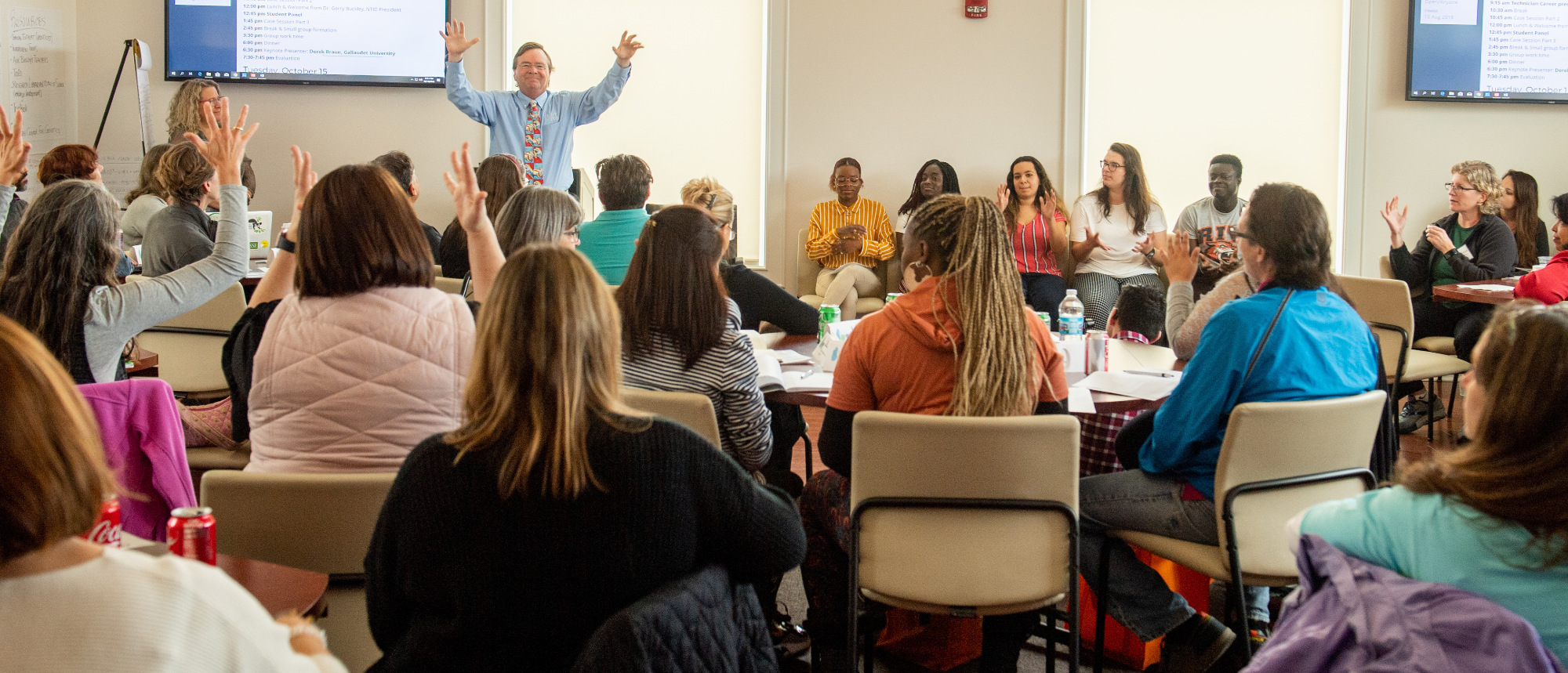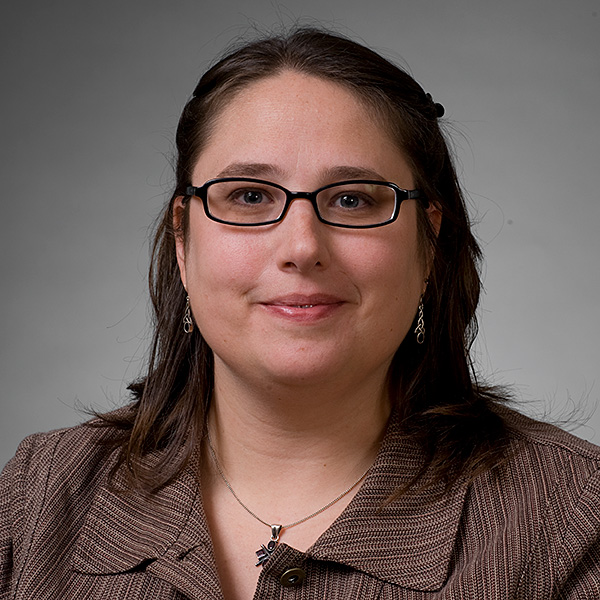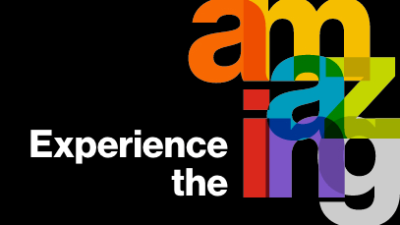From the NTID President's Office


From the NTID President's Office
Breadcrumb
- RIT/
- President and Dean/
- From the NTID President's Office - May 2024
- Antiracism and Social Justice Plan
- Enrollment highlights
- 2021 Annual Report available online
- Dyer Arts Center News
- Academic Affairs highlights
- Research & Scholarship
- Personnel updates
- Three Questions with Jill Bradbury
- New RIT directory feature
- Title IX Survey
- Promotional materials and branding reminders
- Kudos
- In the news
With the semester well underway, we are beginning preparations for a number of exciting spring events, including Imagine RIT and Commencement. We will continue to monitor the pandemic and make adjustments as needed, but we are cautiously optimistic that we have finally turned the corner and are heading toward more normal operations. February brought us excellent programing for Black Heritage Month, and March brings Women’s History and Deaf History month celebrations and activities. Despite all of the challenges, our community continues to move forward thanks to the hard work and resilience of our students, faculty, and staff. I am grateful to each of you.
Gerry

Antiracism and Social Justice Plan
I am pleased to report more progress on the goals and action steps outlined in our Antiracism and Social Justice Plan. In particular, we have continued to increase ALANA representation among faculty, staff, and administrators. As of September 2020, overall ALANA representation was 15%, and as of February 2022, it is 18%. Since October 2021, 22% of NTID’s new hires have been ALANA, and 44% of our new interpreter hires have been ALANA. I am confident that we will achieve our goal of 20% ALANA representation by 2025.
Some additional highlights:
Karen Tobin is joining Sarah Sarchet as a co-mentor to support the NTID Faculty Fellowship program. Karen joined the NTID Science and Mathematics department in 2010 and for the past 12 years has taught courses in the Laboratory Science Technology program and tutored chemistry courses in the College of Science. Before joining NTID, Karen spent 10 years working as an analytical chemist and quality control analyst. Karen brings a passion for mentoring to her new role and has established various mentoring efforts in the Science and Mathematics Department, including creating a mentoring group and pairing senior faculty with junior faculty. This semester, Karen is facilitating a learning circle for NTID faculty tutors.
NTID has worked with RIT to provide sign language video translations for two important campus surveys—the Title IX and Sexual Misconduct Climate Survey, which is being distributed to students this month, and the HEDS Campus Climate Survey, which will be distributed to all members of our campus community in late March. As outlined in our Antiracism and Social Justice Plan, our goal is to increase participation in important campus climate research by ensuring that survey instruments are language-accessible to members our community who use sign language.
RIT Counseling and Psychological Services (CaPS) hosted Black Mental Health Matters February 18 and 19 in collaboration with RIT Multicultural Center for Academic Success (MCAS). This event, a safe space for students identifying as ALANA/BIPOC, focused on the importance of mental health and featured a discussion about the stigma of mental health in Black and Brown communities, the impact of racism on individual mental health, the barriers of asking for help, and the barriers to accessing mental health services at CaPS. The event was open to all ALANA students on campus, and NTID’s Office of Diversity and Inclusion is exploring the possibility of organizing a similar event in the future exclusively for deaf and hard-of-hearing ALANA students.
Visit the Antiracism and Social Justice Plan website regularly for more updates. I’m also pleased to report the NTID’s Office of Diversity and Inclusion soon will be launching a newsletter that will provide more information and highlights on NTID’s diversity and antiracism work.


Enrollment highlights
Enrollment for the spring 2022 semester is up by nearly 60 students over last spring with the greatest gains occurring in cross-registered undergraduate students (up by 25) and MSSE students (up by 20). Both undergraduate and graduate student enrollment are at four-year highs for spring semester. I’m also pleased to report that first-to-second term retention of first-time/full-time students has increased, year-over-year, for all NTID-supported undergraduate student groups.
- Associate degree-seeking: 86.8% (+2.1%)
- Bachelor degree-seeking in other RIT Colleges: 93.7% (+1.2%)
- ASLIE bachelor degree-seeking: 93.3% (+1.3%)
We are in excellent shape with the Early Decision I/II pool, and these are typically the most motivated prospective students. Accepted Regular Decision students will receive their financial aid award packages in mid-March, and it is imperative for members of our community to become involved in personalized conversations with these students to help them in making the final decision to enroll. The Admissions Office will be contacting faculty and staff to request support all the way up to the enrollment deadline of May 1. I know Admissions will benefit from enthusiastic support, and I extend my thanks, in advance, to everyone for helping with the recruitment process.

2021 Annual Report available online
The NTID Annual Report fulfills the requirement of the Education of the Deaf Act that NTID prepare and submit an annual report to the U.S. Secretary of Education. The 2021 Annual Report is an excellent resource that provides a wealth of information about NTID, our students, and our work. Reports for past years also are available online.

Dyer Arts Center News

Two exhibits opened in the Dyer Arts Center this month:
“Journeys: Deaf Refugee Art” on view Feb. 4 – April 1, 2022
Deaf refugees bring with them an array of experiences from their home countries in terms of language, culture and education. The artworks on display in this exhibition will give visitors insight into deaf refugee experiences. Creating and sharing artwork about traumatic experiences is challenging and can promote healing.
This exhibition includes refugee artists from U.S.-based organizations such as Think Self, Deaf Can!, Deaf New Americans, Inc., and Deaf Refugee Advocacy, along with artworks by well-known deaf refugee artists of the past, such as David Bloch and Igor Kolombatovic, and an emerging artist, Samareh Harirchian.
Maryam Hafizirad on view in the Glassroom, Feb. 4 – April 1, 2022
Maryam Hafizirad is a Deaf Canadian Persian painter and sculptor. A graduate of Isfahan University of Fine Arts (2002), Hafizirad had her first exhibition at age 18 in Iran. Her award-winning exhibitions have been featured in Iran, China, Germany, Malaysia, India and Canada. Hafizirad’s early works were dark in subject and color and depicted Persian classical lore.
This exhibit features two installations: “Eyes Must be Washed” and “Unmasked.” These installations involve colorful, glazed ceramic sculptures and affirm her Deaf identity, the gracefulness of sign language, and the quiet strength of life itself.
Academic Affairs highlights
NTID’s Department of Liberal Studies currently offers two immersions: Deaf Leadership and Diversity, Inclusion, and Dialogue, through the new Community Development and Inclusive Leadership major—NTID’s first bachelor’s degree program for deaf and hard-of-hearing students. Minors in these two areas recently received approval from Provost Ellen Granberg and will be available to students starting in fall 2022.
A minor and immersion in Theatre Design and Stagecraft, to be offered by the Department of Performing Arts, also have been approved and will be offered starting in fall 2022.
These minors and immersions demonstrate NTID’s evolution into the bachelor’s degree space. The minors require several more courses than the immersions and are not required for an RIT degree, but give students an opportunity to take even more coursework in one of these areas.
Students in BS and BFA degrees are required to have an immersion; however, students in associate degree programs can take these courses as part of their degree and then use them to declare a minor or immersion once they enroll in a bachelor’s degree program.
These are exciting developments, and provide an even greater breadth of academic opportunities for our students. Join me in congratulating our colleagues in both Performing Arts and Liberal Studies on their progress with these programs.

Research & Scholarship

NTID faculty have produced an extensive collection of academic research that has been published in a variety of journals, positioning NTID faculty in impressive company among their peers at RIT and other institutions nationally and internationally.
- Muirhead, P.S., Nordhaus, J., Drout, M.R. (2022). Revised Stellar Parameters for V471 Tau, A Post-common Envelope Binary in the Hyades 2022 The Astrophysical Journal, 163, 1, 34.
- Dean, R.K. & Pollard, R. Q (2022). Improving interpreters’ normative ethics discourse by imparting principled reasoning through case analysis. Interpreting and Society: An Interdisciplinary Journal.
- Mazique, R. (2021). Deaf Rights as Human Rights: Delimiting the Human with Literatures of ‘The Hearing Line’. Human Rights Quarterly, 43(4), 736-758. Project MUSE, doi: 10.1353/hrq.2021.0058.
- Jacob, B. (2022). A Mother-Mathematician Meets the COVID-19 Era. Journal of Humanistic Mathematics, 12(1), 130-138.
- Adams, A., & Jacob, B. (2021). Failed zero forcing and critical sets on directed graphs. The Australasian Journal of Combinatorics, 81, 367–387.
- Mussallem A., Panko T.L., Contreras J.M., Plegue M.A., Dannels W.A., Roman G., Hauser P.C., McKee M.M. (2022). Making virtual health care accessible to the deaf community: Findings from the telehealth survey. Journal of Telemedicine and Telecare. 1357633X221074863.
- Mangelsdorf, H. H., Listman, J., & Maler, A. (2021). Perception of musicality and emotion in signed songs. Music Perception: An Interdisciplinary Journal, 39(2), 160-180.
- Butler, J. & Bick, S. (2021). Sound, captions, action: Voices in video composition projects. Computers and Composition, 62, 1–15.
- Williams, J., Sarchet, T., & Walton, D. (2022). Reading and writing instruction for academically at-risk deaf and hard of hearing first-year college students. Community College Review, 50(1), 30-50.
- Dean, R. K. (2021). Thinking aloud: Measuring context and ethical sensitivity in medical interpreting. Linguistica Antverpiensia, New Series: Themes in Translation Studies, 20, 248-266
- Dean, R.K., (2021). Healthcare Interpreting Ethics: A critical review. In S. Susam-Saraeva & E. Spišiaková (Eds.), Routledge Handbook of Translation and Health. London & New York: Routledge.
To submit items for research & scholarship highlights, contact Suzi Murad.
Personnel updates
Peter Hauser has been appointed to the position of interim associate dean of research, following Bob Pollard’s retirement. In his new role, Peter reports to Gary Behm, associate vice president for academic affairs.
Peter will continue to oversee the operations of the Center for Culture and Language, as well as provide pre- and post-award support to NTID faculty and advance research preparedness and productivity while engaging in additional activities to further the research enterprise at NTID. A national search will be conducted during AY 2022-23 to fill the ADR position on a permanent basis.
Since 2014, Peter has been director of the Rochester Bridges to the Doctorate program for under-represented minorities in biomedical sciences funded by the National Institutes of Health, and he has been principal investigator of the Broadening the Participation of Deaf Individuals in Sign Language Research program funded by the National Science Foundation since 2013. He served as the Science Mentorship Leader of the NSF Science of Learning Center on Visual Language and Visual Learning from 2011 to 2015. He also has served as the leader of the NTID Pre-Tenure Faculty Group since 2016 and will continue to be the point of contact for tenure-related questions and support. He founded the NTID Tenure Track People of Color group in 2017 that now will be led by NTID’s Division of Diversity and Inclusion executive team, of which he is a member.
In 2011, when Peter received his tenure, he was recognized as one of the RIT’s Principal Investigator Millionaires, and he was the first NTID faculty member who had funding from both National Science Foundation and the National Institute of Health totaling over $1 million. He is a recipient of the RIT Provost’s Award for Excellence in Faculty Mentoring, NTID National Advisory Group Outstanding Service Award, Isaac L. Jordan, Sr. Pluralism Award for Promoting Diversity, RIT Exemplary myCourses Teaching Award, and Provost’s Award for Excellence in Teaching.
Please join me in welcoming the following new members of the NTID community:
- Jennifer Cornwell, senior staff assistant, Information and Computing Studies Department
- Julia Coyle, senior staff assistant, Interpreting Team for SCB and GCCIS
- Tony Ellis, lab coordinator and graphic media technologist, Center on Access Technology
- Vanessa Martinez, apprentice interpreter, Interpreting Team for SDB and GCCIS
- Izaac Ochoa, associate interpreter Interpreting Team for NTID, CET, KGCOE
- Serena Tucker-Cooke, assistant director, NLC Office of Online Learning
Moved to new position:
- Denise Winden, notetaker coordinator, Real-Time Captioning and Notetaking Services

Three Questions with Jill Bradbury, chairperson, Department of Performing Arts
What is the best part of your job?
I get to work with talented, creative, and hardworking people to produce beautiful and innovative art.
What would surprise people to learn about you?
Combining both sides of my family, I have 30 first cousins.
What do you enjoy doing in your free time?
Pretty much anything outdoors.

New video bio feature available for RIT directory pages
RIT ITS has completed the necessary programming to enable faculty and staff members to add a video bio to their RIT directory page. Those who wish to include a video bio can add their video by going to start.rit.edu, clicking on “My Directory Information,” and entering the URL for their video bio into the space labeled “Biography Video.”
Information about creating videos is available online.
To see an example of a video bio included on a directory page, visit faculty member Rain Bosworth’s directory page.
Many thanks to Rain and Jessica Cuculick, chair of NTID’s Liberal Studies department, who were instrumental in the process of making this video bio feature available to all faculty and staff.
Title IX Survey
The Title IX and Sexual Misconduct Climate Survey launched for students on Feb. 21. All students received an email from the Title IX Office providing them with details of the survey, which takes approximately 15 minutes to complete. The survey is available in ASL. Please encourage your students to participate in this important survey.

Promotional materials and branding reminders
If you are planning to create any materials such as hats, shirts, scarves, giveaways, and the like using RIT/NTID logos or other graphics, please contact Suzi Murad in NTID’s Communications, Marketing, and Multimedia Services Department to assist you in making sure your items meet RIT branding standards. These items must be purchased through RIT’s approved vendors. The process is simple, and the CMMS Department is here to help.
Kudos
- Thomas Warfield provided a moving and outstanding performance during RIT’s annual Dr. Martin Luther King Jr. Day “Let Freedom Ring” celebration.
- Tommie Sarchet and Chris Kurz gave presentations at the Zero Conference in Vienna, Austria, Feb. 23.
- Three MSSE students presented at the national conference of the Association of College Educators-Deaf and Hard of Hearing in Omaha, Nebraska. Maya Penn and Matthew Anderson presented about diversity with teacher preparation programs, and Michael Foust had a poster presentation. All did an amazing job.
- Matt Dye, along with researchers from RIT Computer Engineering, Syracuse University, and Boston University had a publication accepted in the journal “Cognition,” outlining their research using computer vision approaches to answer questions about what constrains the structure of signed language.
- Eugene Lylak, professor of English in NTID’s Department of Liberal Studies, was the editor for a published collection of poems by Rochester-area Ukrainian community members. The book, Thoughts without Limits (November 2021), was supported by the Ukrainian Federal Credit Union/Ukrainian-American Community Foundation. In addition to the general editorial, design, and layout responsibility of the book, two of Lylak’s early Vietnam poems were included: Just one more reenlistment and Something else.
- Tiffany Panko, director of the Deaf Health Laboratory in the Center for Culture and Language, will be among 120 women in STEM personified in life-sized statues that will be on display in Smithsonian gardens and in select Smithsonian museums March 5-27 for #IfThenSheCan — The Exhibit.

In the news
- Washington Post article features RIT/NTID alumni Youmee Lee and Laural Hartman, and former Dyer Arts Center Director Tabitha Jacques
- Deaf rapper who studied at RIT will make history at Super Bowl Halftime Show - CNY Central
- Sean Forbes and Warren Snipe: Deaf rappers to make history at Super Bowl LVI show | MEAWW
- RIT/NTID grad will sign language-interpret Super Bowl halftime show - Yahoo News
- NTID alumnus stars in Oscar-nominated film ‘CODA’
- NTID Performing Arts and Dance at RIT presents IGNITE showcase
- Engadget discusses the history of closed captioning and the book Turn on the Words! Deaf Audiences, Captions, and the Long Struggle for Access, by NTID Professor Emeritus Harry G. Lang
- RIT/NTID to offer certificate in Deaf interpreting
- RIT/NTID offers boot camp-style IT training, certification for deaf, hard-of-hearing learners
- Makerspace complex will transform center of campus
- Using dance to break down racial barriers
- RIT/NTID offers IT training, certification for deaf, hard-of-hearing learners (subscriber content)
- RIT/NTID to show virtual performances this weekend of ‘Angels in America’
- Students and Educators Invited to Learn About a Day in the Life of an IT Pro
- RIT/NTID alumnus leads team working on James Webb Space Telescope
- RIT/NTID laboratory director has life-size statue on display for If/Then She Can national exhibit





